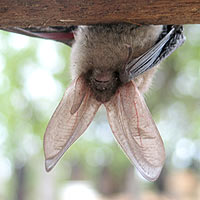
Frequently Asked Questions about Bats
I found a bat in my yard, what should I do with it?
What kinds of bats do we have in Florida?
Do we have Fruit Bats in Florida?
I want to attract bats to my property. How can I do that?
How do I build a bat house?
I built a bat house and no bats are roosting in it! Why not?
What can I do about the bats in my house/building?
Where can I get general information about bats?
Q: I found a bat in my yard, what should I do with it?
A: Call the wildlife rehabilitation center nearest you (see links to resources below).
If you need to pick the bat up to transport it, wear thick leather gloves when handling the bat.
The Wildlife Rehabilitation Information Directory (not a University of Florida web site)
Locate a Wildlife Rehabilitation center in Florida (list includes many but not all wildlife rehabilitators in Florida, this list is not meant to be a recommendation of any service provider.)
Locate a Wildlife Rehabilitation facility in other states (list includes many but not all wildlife rehabilitators, this list is not meant to be a recommendation of any service provider.)
Q: What kinds of bats do we have in Florida?
A: See the following UF/IFAS publications and websites:
Florida Bats
Bats: A Quick Reference Sheet
Bats: Information for the Florida Homeowner
Bats of South Florida
Bats in Buildings
Dealing with Unwanted Wildlife in an Urban Environment
Infectious Diseases of Florida's Wildlife
Q: Do we have Fruit Bats in Florida?
A: Yes. Although most bats in Florida are insectivorous (eat insects), there have been multiple sightings of the Jamaican Fruit-Eating Bat (Artibeus jamaicensis) in Key West. For more information about the Jamaican Fruit-Eating Bat, visit the Bat Conservation International website.
Q: I want to attract bats to my property. How can I do that?
A: Bat Conservation International (BCI): An excellent resource for tips on building bat houses, for purchasing completed bat houses, and for bat-related information and merchandise. Their phone # is 1-800-538-BATS and their website address is http://www.batcon.org/.
Q: How do I build a bat house?
A: For more info on building or purchasing bat houses:
Bat Conservation International (BCI): an excellent resource for tips on building bat houses, for purchasing completed bat houses, and for bat-related information and merchandise. Their phone number is 1-800-538-BATS and their website address is http://www.batcon.org/. Also visit BCI Bat House information.
Definitely read: Criteria for Successful Bat Houses from Bat Conservation International (BCI).
Also, see National Wildlife Federation's Habitat Project on building a bat house.
Q: I built a bat house, but no bats are roosting in it! Why not?
A: Do not despair if bats don't immediately roost in your bat house. Bats may not use the bat house right away. It may even take a few years before bats find or take up residence in a bat house. There are many possible reasons for this:
Bats that have plenty of natural roosting places (such as caves or holes in trees) do not usually need, or use, a bat house.
Also, you may not presently have many bats in your area -- which could be due to the lack of good cavities for roosting. Even though you are now providing a roosting place (bat house), it may take awhile for the bats to discover your bat house and move back into your area.
In addition, bats need roosting space that is humid and stays within a certain temperature range, so a bat house must be constructed correctly to meet their needs or they won't use it.
You can try:
* Moving the location of your bat house every 6 months
* Check the bat house dimensions to make sure it is constructed to suit the bats.
* Read Criteria for Successful Bat Houses from Bat Conservation International (BCI)
Bats usually roost in natural cavities, such as caves, holes in trees, under loose tree bark, etc. Animals that nest or roost in natural cavities are finding fewer and fewer suitable habitats in our state --primarily as a result of development of natural areas in our state. So, a bat house can be very important for bats that are losing natural roosts. When you build a bat house, it's impossible to predict if bats will find it or adopt it as their roost, or how long that will take. However, providing a bat house is a fun project and can be very helpful to bats in need of roosts.
Q: What can I do about the bats in my house/building?
A: Congratulations, you have bats! Bats are an essential link in the balance of nature. In Florida, bats provide a valuable service by consuming mosquitoes and other night-flying insects--while posing little threat to human health. Curiously, bats have been feared and maligned by man since the Dark Ages. Some of this fear comes from the misconception that most bats carry rabies when, in fact, less than 1/2 of 1 percent carry the disease. There is no evidence that widespread destruction of bats or their roosts has reduced the already low health hazard. However, if you find that you need to remove the bats from your house or building, it should be done by excluding entry into the buildings, not by killing them.
For more information about Excluding Bats, read: Excluding Bats from Buildings.
Q: Where can I get general information about bats?
A: Bat Conservation International (BCI)
Florida Bat Conservancy
Lubee Bat Conservancy
Friends of Bats
Bat World Everglades
Bats for Kids
U.S. Fish and Wildlife Service
UF/IFAS publications listed above



 Location: http://yourdomain.edu
Location: http://yourdomain.edu